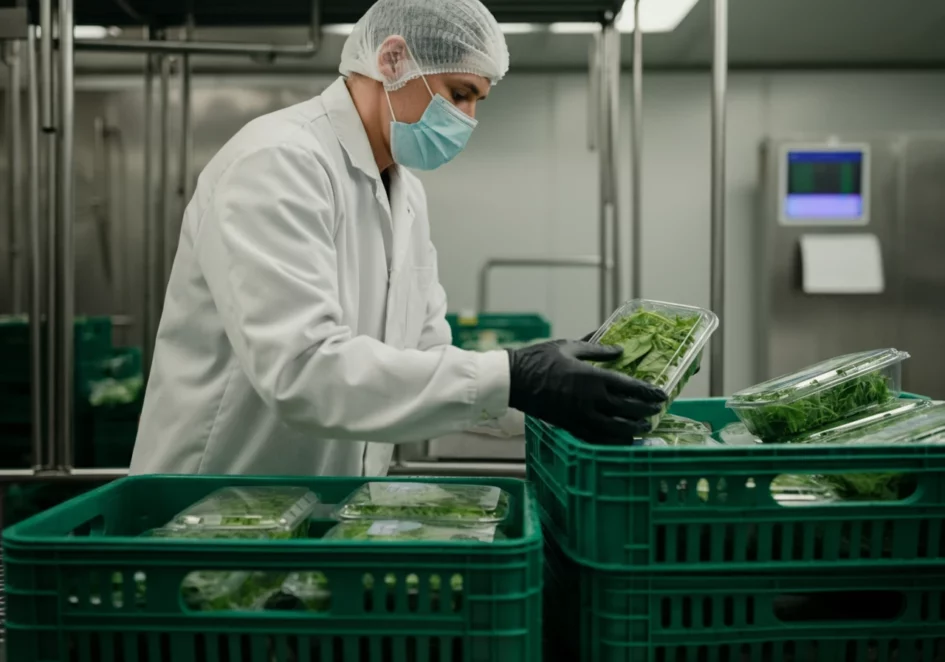In the ever-evolving landscape of the food industry, ensuring compliance with food safety regulations is paramount. With the global food safety audit and certification services market projected to grow significantly, businesses must remain vigilant and prepared for audits throughout the year. This article delves into the importance of food safety compliance audits, how to stay prepared, and the role of technology in enhancing audit efficiency.
The Importance of Food Safety Compliance Audits
Food safety compliance audits serve as a critical mechanism for ensuring that food businesses adhere to established safety standards. These audits not only protect consumers from foodborne illnesses but also safeguard the reputation and financial viability of food businesses. With a staggering economic impact of approximately $75 billion annually in the United States due to foodborne illnesses, the stakes are high for maintaining rigorous food safety practices.
Moreover, a recent survey indicated that 64% of food businesses are extremely concerned about the repercussions of poor food safety compliance audits. This concern underscores the necessity for businesses to prioritise compliance and be proactive in their audit preparations. In-person audits have seen a resurgence, allowing for real-time observations and immediate corrective actions, which further emphasises the need for thorough preparation in food safety compliance audits.

Understanding the Audit Process
The audit process typically involves a comprehensive evaluation of a food business’s operations, including its facilities, equipment, and processes. Auditors assess compliance with various regulations, including hygiene standards, food handling practices, and record-keeping. Understanding the scope of the audit is crucial for businesses to ensure they meet all necessary requirements.
Auditors may use a combination of traditional methods and advanced technologies, such as machine learning models, to enhance the accuracy of their assessments. For instance, the FINDER model has demonstrated a remarkable ability to identify restaurants that are 3.1 times more likely to be deemed unsafe compared to conventional methods. This highlights the importance of staying informed about the latest developments in food safety auditing.
More about: HACCP Audit and Food Safety Inspections: What to Expect
How to Stay Prepared for Food Safety Audits
Preparation for food safety audits should be an ongoing process rather than a last-minute scramble. Here are several strategies to ensure your business is always audit-ready:
- Regular Training and Education: Conduct regular training sessions for staff to ensure they are aware of food safety regulations and best practices. This can significantly reduce the likelihood of compliance discrepancies, which, according to the Food Industry Association, stem from human error in 70% of cases.
- Implement Robust Record-Keeping: Maintain accurate and up-to-date records of all food safety practices, including temperature logs, cleaning schedules, and employee training records. Digital tools and cloud-based solutions can streamline this process, making it easier to access and manage documentation.
- Conduct Internal Audits: Regularly perform internal audits to identify potential areas of non-compliance before the official audit takes place. This proactive approach allows businesses to address issues and implement corrective actions in a timely manner.
- Stay Informed About Regulations: Food safety regulations can change frequently. Stay updated on local, national, and international regulations to ensure your business remains compliant.
Utilising Technology for Audit Preparedness
In today’s digital age, technology plays a pivotal role in enhancing food safety audit efficiency. Mobile applications and cloud-based platforms can streamline the audit process, allowing for more comprehensive inspections. These tools enable businesses to capture data in real-time, reducing the likelihood of errors associated with manual data transcription.
Moreover, technology can facilitate better communication among team members, ensuring everyone is on the same page regarding food safety protocols. By leveraging digital solutions, businesses can not only improve their audit preparedness but also enhance overall operational efficiency.
Common Challenges in Food Safety Audits
While preparing for food safety audits is essential, businesses often face several challenges that can hinder their compliance efforts. Understanding these challenges can help organisations devise effective strategies to overcome them.
Human Error
As previously mentioned, human error is a significant contributor to compliance discrepancies. Employees may inadvertently overlook critical procedures or fail to document their actions accurately. To mitigate this risk, businesses should invest in comprehensive training and implement standard operating procedures (SOPs) that are easily accessible to all staff members.
Resource Constraints
Many food businesses, particularly smaller operations, may struggle with limited resources. This can impact their ability to maintain compliance with food safety regulations. To address this, businesses can consider collaborating with third-party auditors or consultants who can provide guidance and support in achieving compliance without straining internal resources.
Keeping Up with Regulatory Changes
The dynamic nature of food safety regulations can pose a challenge for businesses striving to remain compliant. Regularly reviewing and updating internal policies and procedures in line with regulatory changes is crucial. Joining industry associations or subscribing to relevant publications can help businesses stay informed about the latest developments in food safety regulations.
The Future of Food Safety Audits
As the food safety audit landscape continues to evolve, businesses must adapt to new trends and technologies. The projected growth of the food safety audit and certification services market indicates a rising emphasis on compliance and safety standards. This shift presents opportunities for businesses to enhance their practices and improve their audit outcomes.
Embracing In-Person Audits
The return of in-person food safety audits is a significant development in the industry. These audits allow for a more thorough evaluation of operations, enabling auditors to observe practices in real-time and provide immediate feedback. Businesses should prepare for these audits by ensuring their facilities are in optimal condition and that staff are well-trained in food safety protocols.

Integrating Advanced Technologies
The integration of advanced technologies, such as artificial intelligence and machine learning, is set to revolutionise food safety audits. These technologies can enhance the accuracy of inspections, streamline data collection, and provide valuable insights into compliance trends. Businesses should consider investing in these technologies to stay ahead of the curve and improve their audit preparedness.
Conclusion
Food safety compliance audits are an essential aspect of the food industry, ensuring that businesses adhere to safety standards and protect consumers from foodborne illnesses. By implementing proactive strategies, leveraging technology, and staying informed about regulatory changes, food businesses can remain prepared for audits year-round. The commitment to food safety not only safeguards public health but also enhances the reputation and success of food businesses in a competitive market.
Learn more: HACCP Audit and Food Safety Inspections: What to Expect
FAQs – Food Safety Compliance Audits
Q1. What are food safety compliance audits?
Food safety compliance audits are systematic evaluations of food businesses to ensure they follow established food safety standards and regulations.
Q2. Why are food safety compliance audits important?
They protect consumers from foodborne illnesses, safeguard a company’s reputation, and help businesses avoid costly penalties or recalls.
Q3. How often should a food business conduct internal audits?
Internal audits should be conducted regularly throughout the year to identify and correct issues before the official compliance audit.
Q4. What are the most common challenges during food safety audits?
The main challenges include human error, limited resources, and keeping up with frequent regulatory changes.
Q5. How can technology improve food safety compliance audits?
Technology such as mobile apps, cloud platforms, and AI tools streamlines record-keeping, improves accuracy, and enhances real-time communication during audits.
Q6. What role does staff training play in audit readiness?
Regular staff training ensures employees understand food safety procedures, reducing mistakes and compliance risks.
Q7. What happens if a business fails a food safety compliance audit?
Failing an audit can lead to fines, loss of certifications, reputational damage, or even business closure in severe cases.
Q8. Are in-person audits still necessary in the digital age?
Yes. In-person audits allow real-time observations, immediate corrective actions, and more thorough evaluations of food safety practices.


Leave a Reply